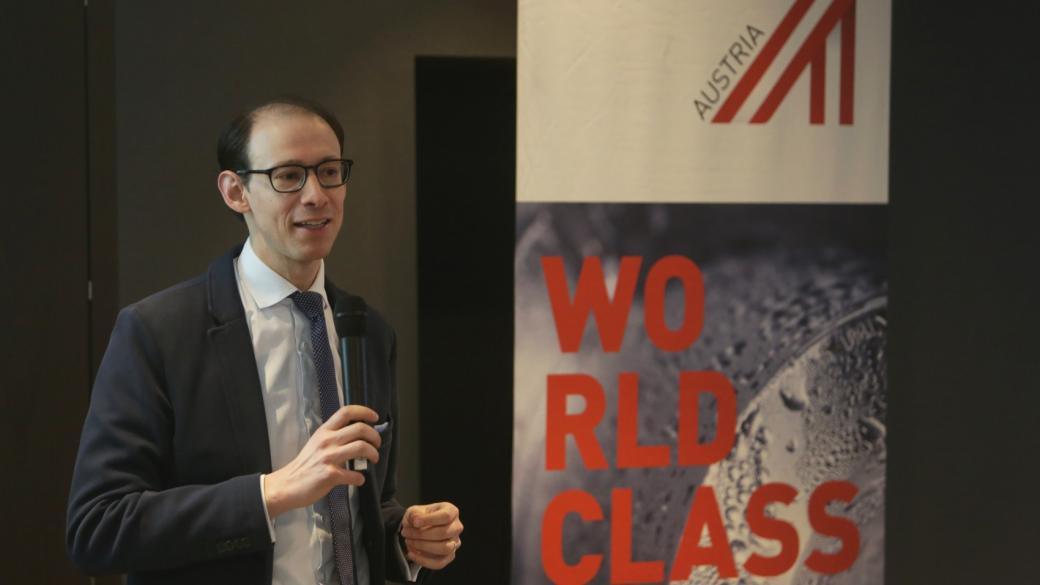Austrian companies are looking for partners and suppliers in Bulgaria
A possible boycott of Austrian companies in the Balkan country because of Schengen inaction would only lead to losses

© ECONOMIC.BG / BTA
While on the political stage it can be said that Austria and Bulgaria are not particularly good friends, given the dispute surrounding Bulgaria's entry into the Schengen borderless area, the business sectors seek to create partnerships between the two countries. Austrian companies are actively looking for partners and suppliers in Bulgaria to shorten their supply chains, and where possible they are discussing options for acquisitions of Bulgarian companies. This applies especially to the metalworking sector. This became clear during the annual meeting of Austrian investors in Bulgaria with the media.
According to the special annual survey of the Austrian Chamber of Commerce in Bulgaria (Advantage Austria), companies from that country operating in Bulgaria increasingly value their Bulgarian suppliers and partners. They are also significantly more positive about the economic climate in the coming year compared to last year. For Austrian business, the main risk to the normal course of business remains the war in Ukraine, as it is the nearest and most dangerous conflict to Europe, and its eventual escalation risks disrupting the supply chains of the otherwise mainly export-oriented production.
As the biggest advantage of Bulgaria, the Austrian businesses this year pointed the 10 per cent flat tax rate. Of course, the decision to invest does not only depend on the tax rate as companies also take into account other factors, such as digitalization, bureaucracy, the labour market, etc.
What’s notable is that for the first year, the Austrian investors in Bulgaria did not indicate corruption and crime as the main issues. These take second place, overtaken by excessive bureaucracy. A serious improvement in the Bulgarian political situation was reported after the last spring elections, which formed the rotating coalition government between GERB and "We continue the change - Democratic Bulgaria", supported by DPS.
More and more Austrian companies in Bulgaria report that labour costs are no longer competitive. According to them, in the last year in some sectors wages have risen so much that for a third of the companies they are already too high.
Philip Kupfer, the commercial counsellor at the Austrian Embassy in Sofia and head of Advantage Austria, drew attention to the fact that direct investments in Bulgaria are increasing mainly thanks to investors who are already in Bulgaria and are expanding their presence, and not to new ones coming in. That’s why, he called, in addition to actively looking for new investors, to also encourage and appreciate the development of those who are already doing business in the country.
According to Bulgarian National Bank data, direct Austrian foreign investments from January to the end of October amounted to about 1.3 billion euros, and the reinvested profits - about 1.1 billion euros.
The survey showed that for two-thirds of the Austrian companies in Bulgaria, the adoption of the euro in the Balkan country would be a positive thing, for 24% it would not change anything, and for only 11% it would have a negative impact. According to Svetla Nestorova, CEO of Bulstrad Insurance Group (part of the Vienna Insurance Group), Bulgaria's accession to the Eurozone would remove a huge capital burden and provide access to better conditions for consumers throughout the financial sector.
Attitudes towards Bulgaria’s entry into the Schengen area mirror those regarding the Eurozone. The Austrian Chamber of Commerce emphasized that it supports Bulgaria's membership in the borderless club, while Mr Kupfer was adamant that this is a political decision, and the two economies will remain close regardless of the political situation. Both he, the Bulgarian Chamber of Commerce and Industry and the Austrian companies present at the event were categorical that a possible boycott of Austrian businesses in Bulgaria because of the Schengen political negotiations would only harm consumers and would be an "extremely ineffective approach".
A boycott never leads to solutions," commented Kupfer.
Translated by Tzvetozar Vincent Iolov

 Antoniya Simova
Antoniya Simova 
